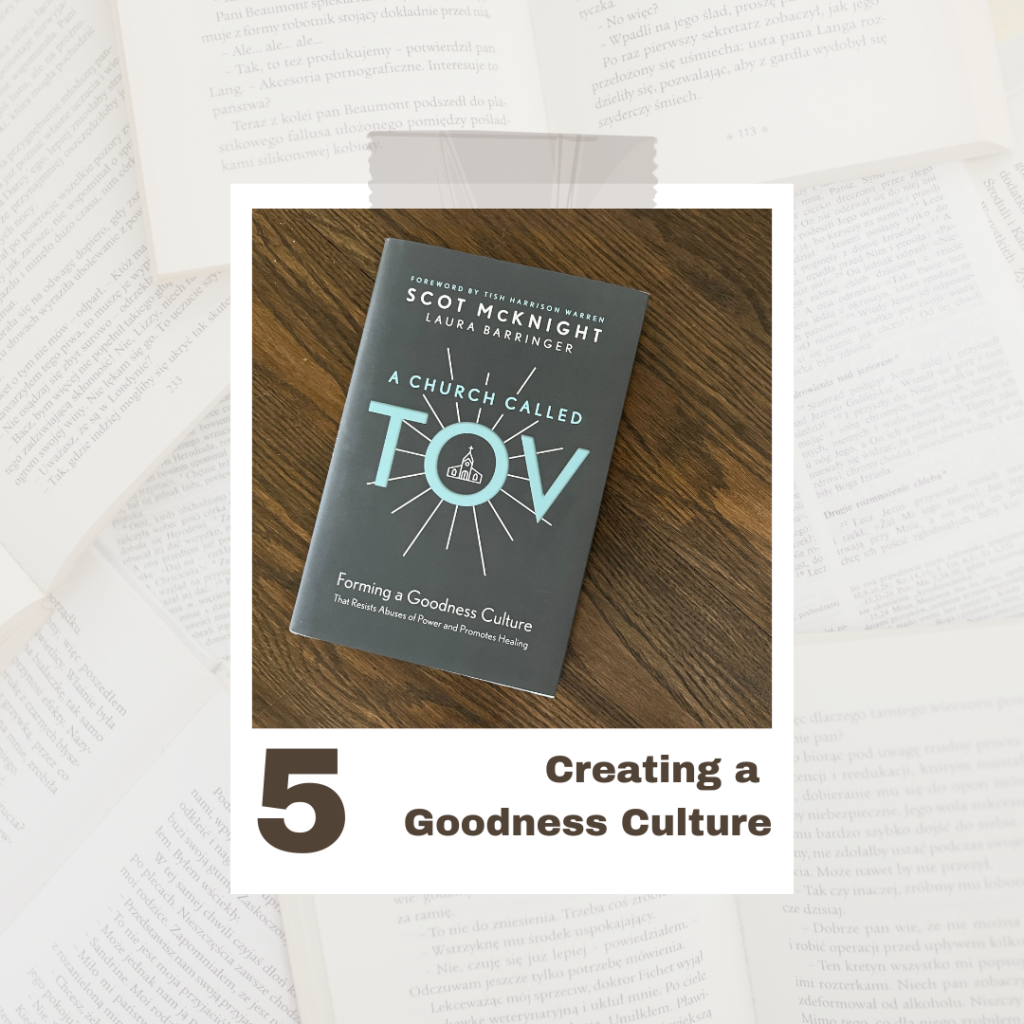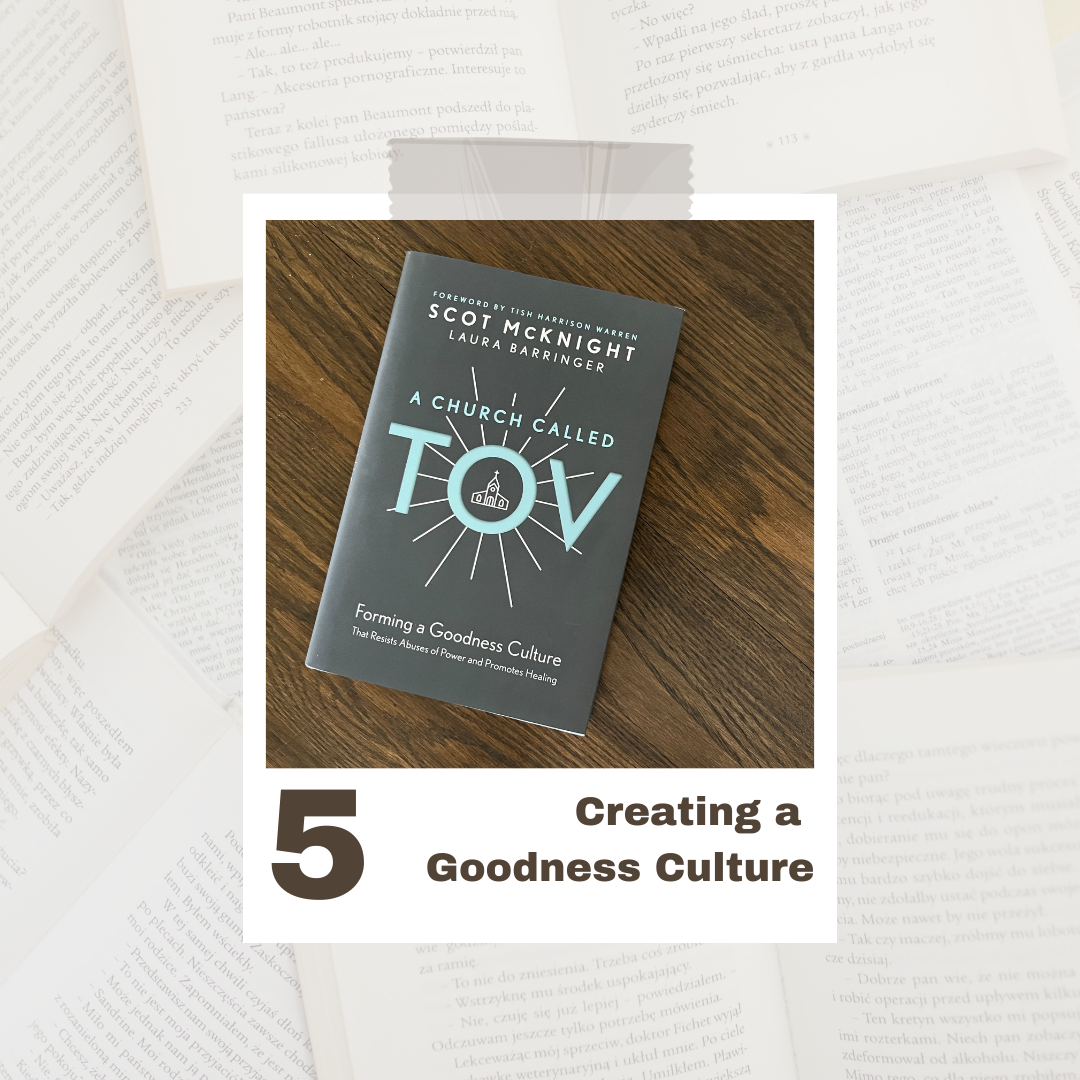
Blog Post: Chapter 5, “Creating a Goodness Culture”
While reading this chapter, I was constantly thinking about ‘Being’ and ‘Doing’ and how they interact with each other. How wonderful it would be if what we do (‘Doing’) would naturally flow out of who we are (‘Being’). Jesus was the perfect example of ‘Doing’ out of ‘Being.’ Below are several of the authors statements that reminded me of the importance of ‘Doing’ out of ‘Being.’
“When everything is in its place doing its proper task, we say, ‘Tov! (p. 88).”
“A Tov life develops in us over time. … To be like Jesus (Christlike) is to be tov; and to be tov is to be like Jesus (p. 89).”
“To be tov is to be a person who, from the inside out, consistently does what is right and generous. A tov culture forms when individuals are tov and do acts of tov (p. 90.)”
“What every church needs is a model of goodness – in its pastors, its leaders, its people. It will come as no surprise that the perfect example of tov is Jesus (p. 94).”
“He did all this because God was with him and in him, and working through him to accomplish the tov gospel for all of us (p. 95).”
“If we as individuals in the church will pursue Jesus’ tov way of life, we will help to create a tov culture (p. 96).”
How do we ‘Do’ this? ‘Be’ and then ‘Do’? The Polyvagal Theory can aid in the knowledge and understanding of our nervous systems in the realm of Being and Doing. While understanding how we function inside is valuable, I want to emphasize that being yielded, obedient, and expressing humility before God is foundational to the inner work/healing we take part in.
How can the Polyvagal Theory make a difference – the three states of Ventral, Sympathetic, and Dorsal? By understanding, knowledge, and awareness of how our central nervous system operates. We travel through the three states frequently during the day, often without awareness; we tend to ‘see,’ interpret, and react to the world out of the state we are in. If in Ventral, we tend to interpret a comment/event/interaction etc. from a safe and connected place. If in Sympathetic, we will likely interpret the same comment etc. from a fight/flight stance, unsure about connection. If in Dorsal, we may interpret the world from a disconnected, immobile place and find it hard to connect.
When the body of Christ gathers, it is also a gathering of nervous systems, who ‘act’ and ‘do’ out of their ‘being’. Thanks to Deb Dana, LCSW for the following information that describes each state:
When in Ventral – safely embodied, co-regulate, self-regulate, connected to self, others, the world, spirit, able to acknowledge distress, explore options, reach out for/offer support, resourced and resourceful.
Think of ‘standing up straight’ and feeling capable.
When in Sympathetic – mobilize to survive, move into fight or flight, feel out of sync with others, driven to get needs met, alarmed, anxious, hypervigilant, misread cues, listen for sounds of danger, sacrifice social engagement for survival.
Think of ‘shoulders tense and back’; ready to defend/protect self.
When in Dorsal – withdraw, shut down, collapse, become foggy, numb, go through the motions without awareness, disconnect from self, others, the world, spirit, feel lost, abandoned, invisible, disappear into a state of not knowing, not feeling, not being.
Think of ‘shoulders slumped’ and feeling incapable; difficult to navigate the day.
How can this help me create a ‘Goodness Culture?’ When I did an exercise to help me understand my own three states, I sensed that we humans were created to be in Ventral. Due to our ‘blunders’ and the ‘blunders’ of others, we do not naturally live in Ventral. Be curious about which of the three states you are in; there is a reason for it. Avoiding, running away, hiding from the uncomfortable-ness of Sympathetic or Dorsal is not the answer. Pain and suffering need to be met with compassion. An open heart and curiosity can lead to better understanding of each state. Talk with a safe trusted person; perhaps professional help may be needed. Be honest with yourself. This is an integral part of the life journey that leads us to Tov.
‘Being’ and ‘Doing.’ Caring for all that is inside us – our body, soul, and spirit – with compassion and curiosity is a great stepping stone in creating a Goodness Culture and will in time lead to a lifestyle of increased ‘Doing’ out of ‘Being,’ thus becoming more able to contribute to a tov church body.
Blog Post from Dianne Loerchner, Registered Psychotherapist and Elder at Kingsfield Zurich Mennonite Church





